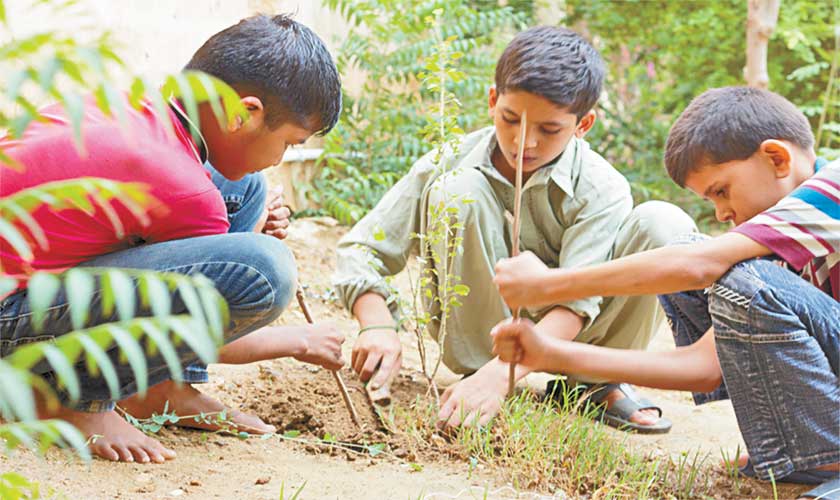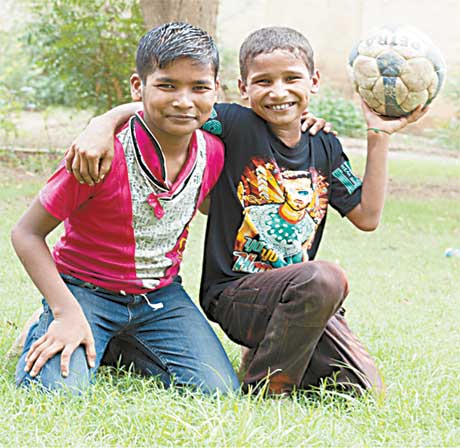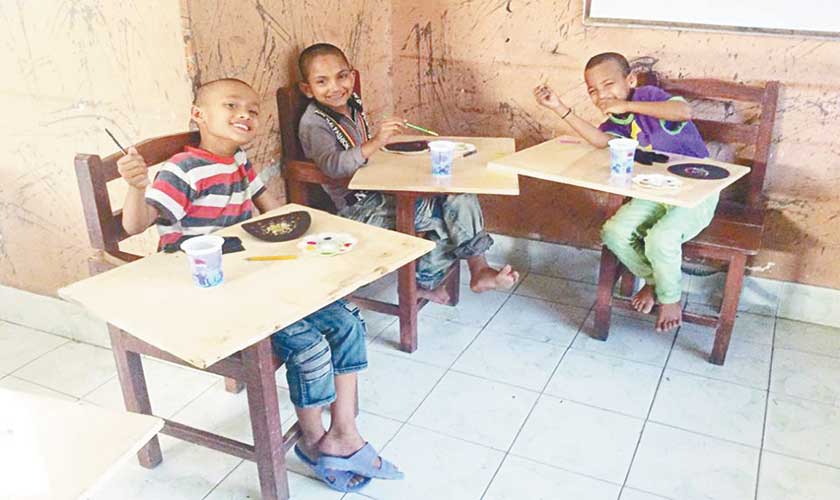As much as the news of deaths all around the world have desensitised us, we do muse over the same question occasionally: what is the cost of saving a human life? One of the leading non-profit rehabilitation and aftercare organisations, Alleviate Addiction Suffering (AAS Trust) is working to eliminate one of its causes – addiction – and it is doing so for children absolutely free!

Set up by Mr. Abdul Rehman Allana, a Karachi-based industrialist and philanthropist, in Karachi in 2000, the Trust is devoted to treating substance abuse/dependency amongst street children and underprivileged adults. I talked to the people working behind the scenes of the organisation.
Addiction and why it is a threat
Addiction is a complex systems theory where a combination of factors leads to it. An individual might be genetically susceptible, but if they never use these substances, they cannot become dependent. Different factors such as availability, personality type, peer pressure, fashion, family relationships, culture, abuse, psychological distress, etc. come into play before a person begin using, and eventually, depending on it. Therefore, someone who is not genetically predisposed can become dependent. It’s important to look at the interaction between the individual, society and environment in order to determine the causes of addiction.
Addiction is not only physiologically destructive for the addicts, but also financially and socially; if left untreated, it could lead to death. The stress and adverse effects invariably extend to the addicts’ families, social circles, employers, etc. Finally, addiction is often related to crime and accidents.
Usage of crystal meth is slowly increasing in our society. In the upper class, the most commonly abused drugs are heroin, cocaine, alcohol and cannabis.
Where AAS Trust fits in
AAS Trust rehabilitates individuals suffering from substance addiction and co-occurring addictive behaviours.
So far, the organisation has established four rehabilitation centres. Two of them provide primary care, separate for children and adults; residential treatment and counselling is provided for three months. The other two have been built as follow-up centres where patients receive residential counselling for another six months; further, imparting education to children in particular is to ensure a supervised transition to normalcy. At the end of this nine-month period, the child can opt for the hostel/vocational training centre until they feel comfortable returning to their homes.
All expenses for children, including food, housing, clothes and foster care, are paid by the Trust. Adults pay a minimal amount of PKR 12,000 every month for food and lodging; treatment and counselling is free of cost.
On February 1 this year, the AAS Trust launched the AAS Recovery Centre (ARC), a state-of-the-art residential rehabilitation centre for full-paying clients. Besides catering to the need for quality addiction centre in upper-class society, it generates funds for the on-going operations at the AAS centres.
* Other facilities
There are certain safety protocols strictly adhered to. Besides having our staff and nurses available on-duty 24 hours for medical and psychological emergency, these include maintaining confidentiality and identity of clients.
At the same time, an intensive family programme is offered to give them a chance to understand how their actions play a role for their loved one to achieve sobriety and how best they can support the person in recovery.
* The 12-step based recovery programme
Also, and more importantly, no one is kept here against their will. The clients have to be willing to come into treatment. Through a combination of group counselling, one-on-one counselling, psycho-education, specialised therapeutic interventions and alternative therapies, the individual is attended to in a holistic way. They acquire skills to successfully manage their addiction since the plan addresses both symptoms of addiction and the underlying causes, which in turn ascertain a higher rate of recovery than has been possible before.

A form of community-based treatment, it assists people suffering from addiction to come together in a safe, non-judgmental and healing environment to share and gain acceptance. With body-work and meditation, for instance, the clients are initiated into a process of self-growth and awareness, making the necessary changes from within to achieve abstinence and sobriety.
Psst! Nothing is impossible!
So far, the organisation is overcoming challenges like stigma attached to addiction and the lack of knowledge in Pakistan. They have run school awareness programmes where students openly discussed how easily they have been accessing drugs. It only showed how essential it was to talk to them about the negative impacts of these substances so that they would not abuse them and the teachers would know how to assertively deal with the abusers.
And how can we be of help, what’s our part in this war against drug addiction? One, to educate our society on addiction and reduce the stigma attached to it. Two, see that treatment is accessible for everyone, irrespective of their socio-economic status.
Success Story: Ahsan
Ahsan, a 12-year-old boy, and his seven siblings, had grown up watching their parents constantly quarrel. He ran away from home multiple times to escape physical abuse by his father. On the streets, he would steal and beg for money to survive. He would self-harm and use drugs (charas) as a way to escape the immense pain he was suffering from. Soon, he became addicted and often when he would go home, his father would chain him so that he would not go out on the streets and use drugs again.

When Ahsan went to jail at the age of six, his parents took him to the Edhi Centre. There, he stayed with people suffering from mental illnesses. The experience affected him psychologically; he was unable to recognise even his own mother. Ahsan’s older brother had recently completed his three-month treatment at the AAS Children Primary Unit (CPU). Knowing the effectiveness of the programme, their father brought Ahsan here.
At the AAS CPU, Ahsan became isolated because other children teased him for the way he looked – he was extremely thin – and that his parents rarely came to visit him. He began to show tantrums and had trouble trusting people around him. With staff care and support, however, he started to trust and open up.
He then went to the AAS Children Halfway House (CHH) in February 2015. Through one-on-one counselling, he explored in depth his issues with parental conflict and abuse, and he started working on his self-esteem and anger. The counsellors worked with his family, too. Now his parents, especially his father, visit him more often and are more concerned about his well-being and education. Having only studied till Grade II, Ahsan was interested in pursuing his studies. In October 2015, he got admission at Crescent Children’s Academy near the AAS CHH. Although he joined in the middle of the school year, Ahsan’s progress was remarkable; he came third in his class and was promoted to Grade IV.
Ahsan is now a social and energetic boy; he takes care of the way he looks and behaves. The progress with his family has made him more comfortable visiting home. He completed one year of recovery on November 27, 2015 and continues to work toward completing his second year at AAS.
Drug abuse in Pakistan is highly differential by gender. The national population prevalence, according to the United Nations Office on Drugs and Crime (UNODC) Drug Statistics Report 2013, is 5.2M men as compared to the 1.5M women. When comparing the difference in the type of drug used by each gender, there is remarkably higher use of prescription opioids among men, and tranquilisers and sedatives among women.